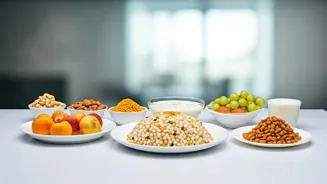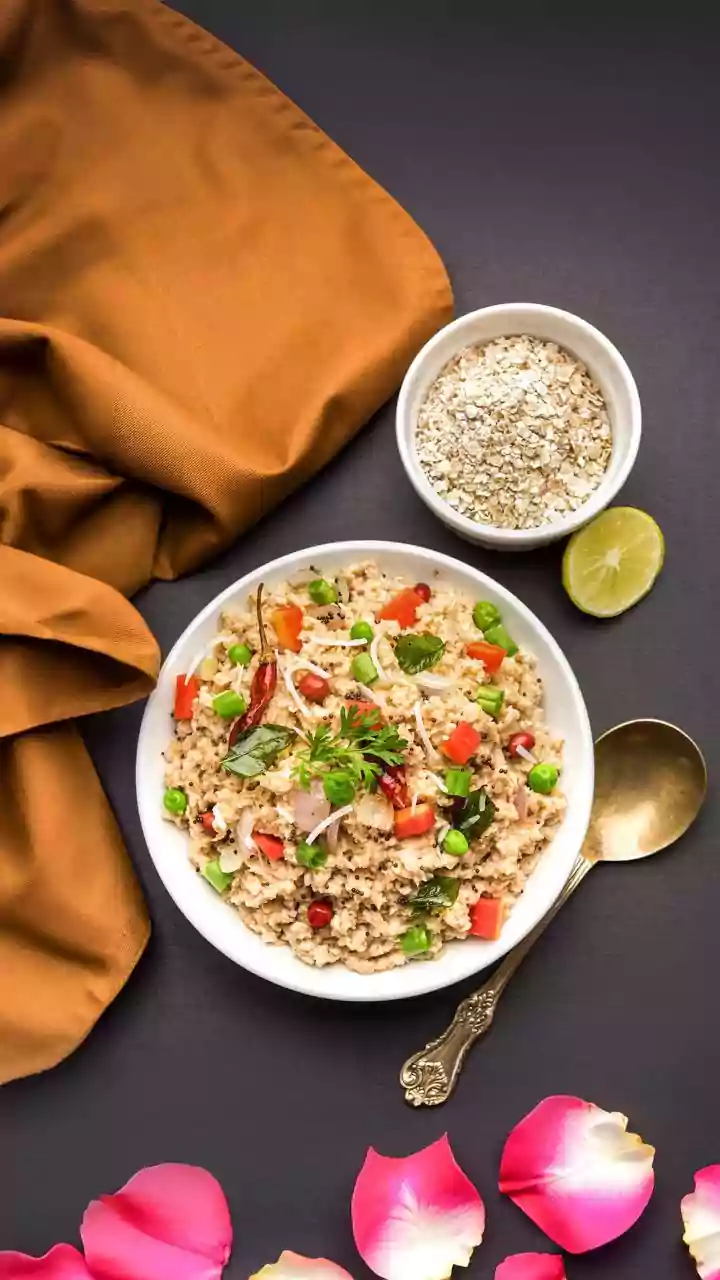Introduction to Fasting
Navratri is a significant Hindu festival observed with devotion and various rituals, including fasting. Fasting during Navratri involves abstaining from
certain foods, following specific dietary guidelines, and it is a spiritual practice with diverse interpretations. Typically, this involves avoiding grains, certain vegetables, and specific spices. However, it's important to personalize the fasting process according to individual preferences, health, and the specific traditions followed. The goal is to cleanse the body and mind, promoting spiritual growth and well-being during this auspicious period.
Sabudana Khichdi Delight
Sabudana khichdi is a popular fasting dish, primarily made from tapioca pearls (sabudana). The dish is created by soaking sabudana until they soften. These pearls are then mixed with potatoes, peanuts, and spices like cumin and green chilies. Sabudana khichdi is quick to prepare and is known for its light, yet filling texture, making it perfect for a light lunch or snack during office hours. One can easily prepare it in advance to save time and keep up with a busy office schedule. The combination of ingredients provides a balance of carbohydrates and healthy fats, making it a satisfying choice.
Makhana (Fox Nuts) Magic
Makhana, also called fox nuts, is an excellent fasting food. These puffed seeds are rich in nutrients and can be consumed in several ways. For instance, they can be dry-roasted or lightly sauteed with spices to create a crunchy snack. Makhana can also be added to kheer (a sweet rice pudding) or made into a savory snack with a dash of salt and pepper. Furthermore, Makhana offers a good source of protein and fiber, which helps in keeping you full for extended periods. Their versatility and ease of preparation make them ideal for office consumption.
Kuttu Atta Options
Kuttu atta, or buckwheat flour, is another staple during Navratri. It can be used to make various dishes like rotis, parathas, and pooris. Prepare these at home in the morning, pack them, and take them to the office. Kuttu atta can also be used to make a quick pancake or a savory upma. It provides energy throughout the day. It is a gluten-free option suitable for those who want a lighter meal while observing the fast. Kuttu atta offers a nutritious and versatile choice for managing workdays during fasting.
Sweet Potato Versatility
Sweet potatoes are another fantastic addition to the list. These can be boiled, baked, or even microwaved for quick preparation. Sweet potatoes are rich in fiber, vitamin A, and antioxidants, making them a superfood during fasting. Carry cooked sweet potatoes with you to the office and enjoy them in multiple ways. They can be eaten as is, spiced with a pinch of black pepper and salt, or added to salads. Sweet potatoes offer a sweet and satisfying option that also provides necessary nutrients to maintain energy levels all day long.
Fruits and Dry Fruits
Fruits and dry fruits are excellent choices for maintaining energy levels during the day, and are some of the easiest snacks to bring to work. Bananas, apples, oranges, and pomegranates are all permissible and easily portable. Pack a mix of fruits to get the benefit of various vitamins and minerals. Dried fruits like dates, figs, and almonds provide a quick burst of energy and are easy to carry in a compact container. Combining fruits and dry fruits allows for a natural sweetness and essential nutrients.
Vegetable Curries, Fasting Style
Prepare light vegetable curries with ingredients allowed during fasting for a fulfilling lunch or dinner. Use potatoes, bottle gourd, or pumpkin in your curries, and flavor them with simple spices like cumin and coriander. These can be cooked in advance and carried to the office in a tiffin. Serve these curries with kuttu or singhara atta rotis for a balanced meal. The advantage is that these curries are easily customizable and can be adjusted based on personal preferences and the foods one enjoys. This ensures that you enjoy a tasty and nutritious meal.
Dairy Products for Energy
Dairy products, such as milk and yogurt, provide a steady supply of energy and are permissible during Navratri. Carry a small container of yogurt to the office and have it with fruits or dry fruits. You could also drink a glass of milk. This helps you feel full for a longer period. Milk-based desserts, like kheer made with sabudana or fruits, can also be prepared in advance. They are great for satisfying your sweet tooth while adhering to the fasting rules. Dairy products make an easy addition to a fasting meal, ensuring adequate nutritional intake.
Beverages for Hydration
Staying hydrated is crucial during the fasting period. Consume plenty of water, along with permissible beverages, such as buttermilk, fruit juices, and coconut water. Coconut water is especially beneficial as it contains electrolytes and provides a cooling effect. Carry a water bottle and keep refilling it during the day to stay hydrated. These beverages provide necessary hydration and can refresh your body throughout the day. Remember to avoid caffeinated drinks during fasting. Hydration is crucial for overall well-being, especially during the fasting period.
Tips for Meal Planning
Planning ahead is essential for a smooth fasting experience during office hours. Begin by preparing a weekly meal plan, listing all the permissible food items you can eat. Cook the dishes ahead of time and store them in individual containers for easy access. Pack your meals and snacks the night before to save time in the morning. Consider preparing a variety of dishes to avoid monotony. By following these simple steps, one can simplify fasting, ensuring that they can focus on their work while staying true to their religious observances.





















